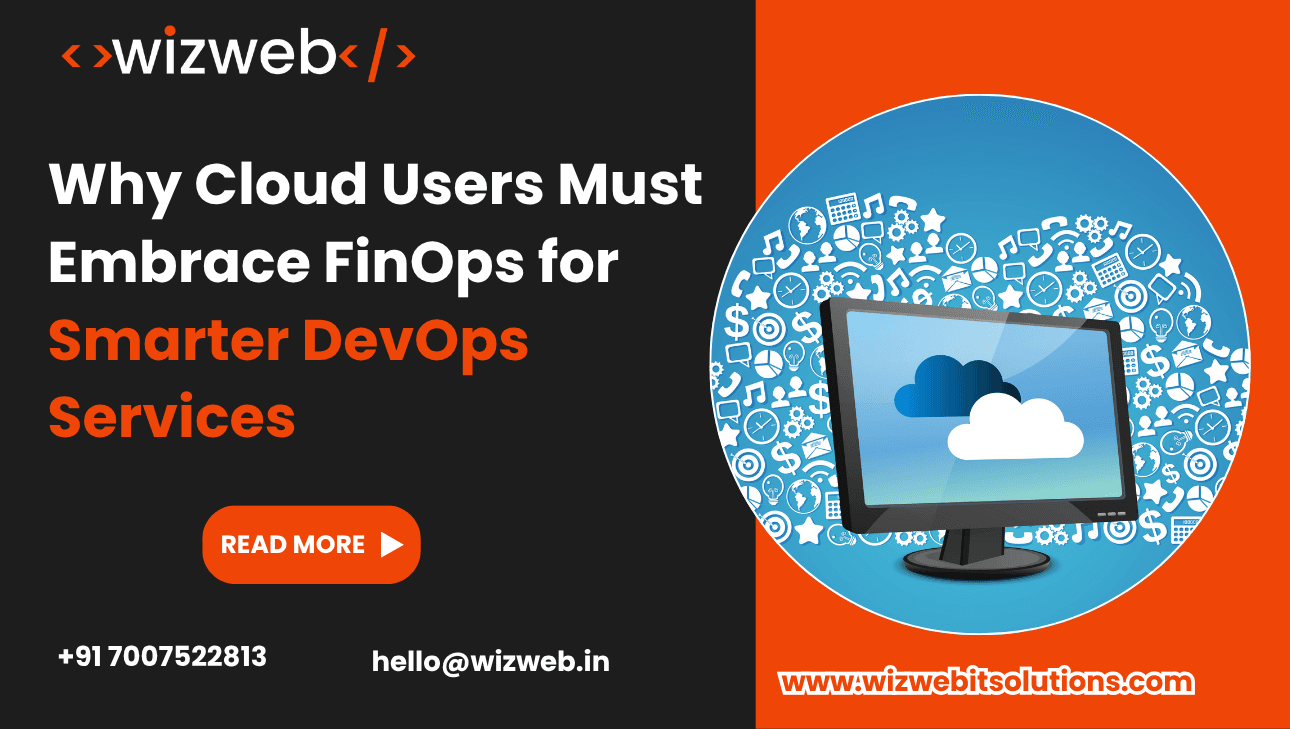Get in Touch
- Phone
+91 700 752 2813
- Email Now
hello@wizweb.in
Office No - 204 A-140, Sector 63 Road Noida, Uttar Pradesh 201301

Cloud computing has revolutionized how businesses build, deploy, and scale applications. From startups to enterprises, the cloud promises agility, flexibility, and scalability. But while the benefits are undeniable, one critical challenge often goes unnoticed until it becomes a burning issue: managing cloud costs effectively.
This is where FinOps—a blend of “Finance” and “DevOps”—comes into play. For organizations leveraging the cloud at scale, FinOps is no longer optional. It’s becoming a necessity for achieving both financial efficiency and operational excellence.
At Wizweb IT Solutions, where we specialize in providing cutting-edge DevOps services, we’ve seen firsthand how cloud costs can spiral out of control without the right strategies. This blog explores why every cloud user should start thinking FinOps today, and how pairing it with DevOps can transform both cost management and business agility.
FinOps is a cultural and operational practice that brings financial accountability into the cloud. Instead of treating cloud costs as a back-office concern, FinOps ensures that engineering, operations, finance, and business teams collaborate to manage usage, optimize expenses, and align spending with business goals.
Think of it as an extension of DevOps. While DevOps breaks down silos between development and operations to deliver software faster, FinOps adds financial visibility to that equation—ensuring speed does not come at the cost of inefficiency.
The pay-as-you-go model makes cloud appealing, but without controls, it can lead to surprise bills. Engineers spin up resources for testing or scaling but forget to decommission them, leading to waste.
AWS, Azure, and Google Cloud offer hundreds of services with different pricing models. Without dedicated oversight, businesses often pay for unused capacity or misconfigured services.
In many organizations, cloud bills are lumped together. This makes it hard to track which team, product, or customer workload is driving costs—leading to inefficiencies.
DevOps practices emphasize speed and innovation. Without FinOps in the mix, financial discipline takes a backseat, causing long-term cost leaks.
1. Financial Accountability Across Teams
FinOps ensures transparency in cloud spending. Teams know how their choices impact the bottom line, and costs are allocated fairly to the right projects.
2. Optimized Resource Utilization
Continuous monitoring prevents over-provisioning. For instance, resizing underutilized servers or shifting workloads to reserved instances can save thousands of dollars monthly.
3. Aligning Cloud with Business Goals
Every dollar spent in the cloud must serve a purpose—whether improving customer experience, supporting innovation, or driving revenue. FinOps helps link technical decisions to business outcomes.
4. Scaling with Confidence
As organizations grow, cloud usage scales exponentially. FinOps provides the governance and automation needed to scale without financial chaos.
5. Sustainability Benefits
FinOps also contributes to green IT practices. By reducing unnecessary workloads and optimizing consumption, businesses can lower both costs and carbon footprints.
At first glance, FinOps might seem like it’s only about finance. But in reality, FinOps thrives when integrated with DevOps practices. Here’s how:
Automation through DevOps pipelines ensures that cost optimization is built into the software lifecycle (e.g., automated shutdown of idle instances).
Monitoring and observability tools—common in DevOps—can also track usage metrics for FinOps dashboards.
Collaboration culture that DevOps fosters makes it easier to align finance, engineering, and product stakeholders.
At Wizweb IT Solutions, our DevOps services are designed to incorporate FinOps principles right from infrastructure provisioning to continuous deployment. We help businesses not only move faster but also spend smarter.
Create Cross-Functional FinOps Teams
Bring finance, engineering, and product teams together to own cloud cost optimization collectively.
Implement Chargeback/Showback Models
Assign costs to specific teams or workloads to build accountability and transparency.
Use Cloud Cost Management Tools
Platforms like AWS Cost Explorer, Azure Cost Management, or third-party tools like CloudHealth provide granular insights.
Automate Wherever Possible
Automate resource scaling, instance scheduling, and de-provisioning to eliminate manual errors and waste.
Track KPIs and Continuously Optimize
Monitor unit costs (e.g., cost per customer, cost per transaction) and regularly review workloads for efficiency.
Educate Teams on Cloud Economics
Engineers and product managers should understand how their choices impact costs—not just performance.
As more organizations embrace multi-cloud and hybrid-cloud strategies, FinOps will become even more critical. Gartner predicts that by 2026, over 70% of cloud users will have formal FinOps teams in place. This isn’t just about saving money—it’s about creating a sustainable, efficient, and scalable approach to cloud adoption.
FinOps will also integrate more closely with AI and automation, enabling real-time cost optimization without human intervention. Companies that adopt it early will have a significant competitive advantage.
The cloud has transformed the way businesses innovate, but without cost accountability, it can quickly become a financial drain. FinOps ensures that organizations get the most value out of their cloud investments while maintaining agility and scalability.
For companies already practicing DevOps, adding FinOps is a natural next step—merging speed, reliability, and cost efficiency. At Wizweb IT Solutions, our expertise in DevOps services and cloud management helps clients adopt FinOps seamlessly, unlocking both performance and profitability.